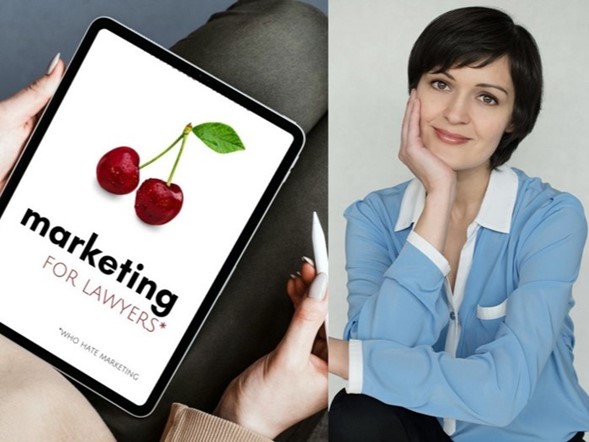From Reluctance to Recognition: A Lawyer-Friendly Guide to Marketing That Works
In a profession often defined by caution, rigor, and tradition, the mere mention of “marketing” can trigger a range of uncomfortable reactions among legal professionals. Maria Boicova-Wynants recognizes this tension and addresses it head-on in her insightful and entertaining guide, Marketing for Lawyers Who Hate Marketing. This book is not just a tactical manual. It is a well-paced conversation between an experienced guide and her reluctant, sceptical reader. And it works.
Marketing with Integrity, Not Hype
The core appeal of this book lies in its author’s authentic tone and her deep understanding of the legal mindset. Boicova-Wynants avoids fluff and never patronizes. Instead, she respects the intelligence of her audience while challenging their assumptions. She begins with a crucial truth: being good at your job is no longer enough. In a saturated legal market, personal branding is not optional. It is a professional responsibility.
The author doesn’t force the reader into a stereotypical salesperson role. Instead, she reframes marketing as a method of service, visibility, and communication. Her message is clear: if you believe in your work, you owe it to your ideal clients to help them find you. Marketing, in this context, becomes a bridge, not a billboard.
Personal Branding: Your Professional Fingerprint
One of the most compelling ideas in the book is the concept of building a personal brand as your “professional fingerprint.” This is not about logos or slogans. It is about standing out in a meaningful way. The book guides readers through the process of identifying their ideal audience, crafting a relevant message, and consistently showing up in the places where that audience spends time.
Through her examples—ranging from the introverted lawyer who becomes a trusted advisor through thoughtful content, to the former park ranger turned environmental attorney—Boicova-Wynants demonstrates how individual stories become powerful differentiators. These stories aren’t just personal quirks; they are assets.
Strategy Before Tactics
Rather than jumping straight into posting schedules or SEO tips, the book emphasizes strategic thinking. Readers are prompted to define their niche, articulate their value proposition, and choose the right channels based on where their clients actually are. Boicova-Wynants repeatedly reminds her audience that marketing is not about being everywhere. It’s about being in the right place, with the right message, for the right people.
The strength of this book is its lawyer-centric examples. Whether describing how a startup lawyer might use LinkedIn, or how a family law attorney could partner with therapists and community centers, each scenario is rooted in the real world. These are not marketing fantasies. They are credible, doable strategies.
Content Without the Cringe
Another highlight is Boicova-Wynants’s treatment of content creation. She busts common myths, like the fear of giving away too much expertise for free or the concern about being repetitive. She encourages consistency over volume and relevance over reach. And she makes the point that content is not just educational; it is relational. People hire people they feel they know and trust.
The author also addresses tone with care. She endorses humor, storytelling, and authenticity, but always within professional boundaries. A recurring theme is: let people see the human behind the credentials. Because in the end, trust is built through connection, not perfection.
Overcoming the Fear of Being Seen
In perhaps the most emotionally resonant sections, Boicova-Wynants addresses the psychological hurdles that lawyers face when stepping into the spotlight. Impostor syndrome, fear of judgment, and the discomfort of self-promotion are explored with empathy and practical advice.
Instead of offering empty motivation, the book provides tools: write down your wins, share your imperfect stories, start small but stay consistent. These suggestions are as useful as they are reassuring. They reflect the book’s underlying message that professional visibility is a skill that can be learned—and that it gets easier with practice.
Written by Someone Who Truly Gets It
What makes this book stand out in a crowded field of personal branding and business development guides is its combination of tactical depth and psychological insight. Boicova-Wynants knows her audience. She respects their aversion to gimmicks and their preference for substance. But she also challenges their hesitation and offers a path forward that feels both empowering and attainable.
This is not marketing advice repackaged for lawyers. This is a book that understands how lawyers think, what they fear, and what they truly need in order to grow sustainably.
Why This Book Deserves Your Attention
In an era of AI-generated content, commoditized legal templates, and constant digital noise, the legal profession faces a paradox. Expertise is more important than ever, yet harder to communicate credibly. In this context, Marketing for Lawyers Who Hate Marketing arrives as a crucial guide. It doesn’t teach lawyers how to become influencers. It teaches them how to become visible, trusted, and memorable to the people who matter most.
A Human, Practical, and Empowering Conclusion
This book will resonate with any lawyer who has ever thought, “I hate the idea of marketing, but I know I can’t ignore it.” Boicova-Wynants doesn’t promise easy wins or overnight fame. Instead, she offers something much more valuable: clarity, structure, and encouragement.
For lawyers who want to build a meaningful practice without compromising their values, this book is more than a guide. It’s a permission slip to show up, speak up, and connect—authentically and effectively. And one final thought: Maria herself is a very good role model when it comes to successful marketing for one’s own cause.
Here is an interview with Maria Boicova-Wynants about online marketing



